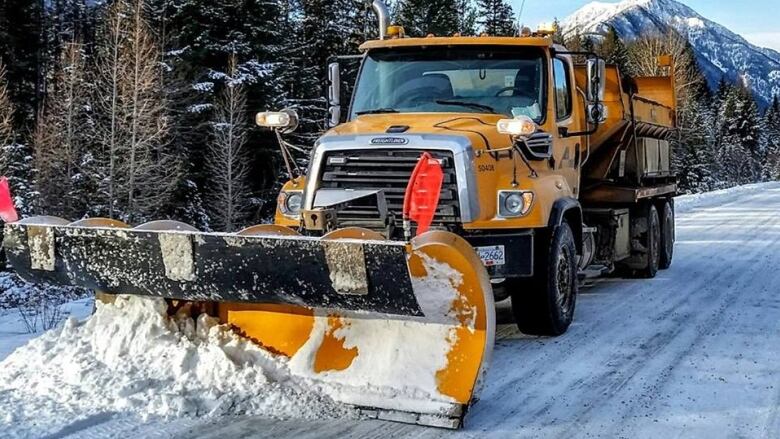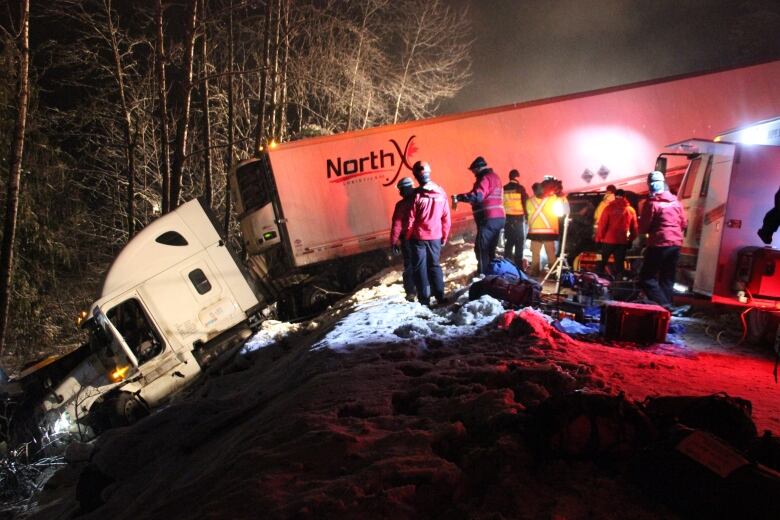Highway maintenance in B.C. could soon get big overhaul
26 of 28 contracts are up for renewal in the next 19 months; and stronger regulations are on the way

Every winter in B.C. brings stories of highway crashes in poor road conditions and with it, demands that tougher regulations be instituted forcontractors that maintainmajor roads.
The former won't change anytime soon, but over the next 19 months, higher maintenancestandards will be rolled out for virtually every highway in the province.
"This is one of the biggest issues of safety we hear all the time, and it is obviously a very real concern," said Transportation Minister Claire Trevena.
"I've asked thatwe improve the maintenance standards, so they will be higher, and the maintenance contracts will have to live up to them."

More patrols andremove potholes
In total, 26 of the 28 contracts for the province are being renewed between now and Oct. 2019, covering roughly all areas of the province outsideEast Kootenayandthe stretch of Highways 16 and 5 between McBride and Clearwater.
The old contacts were all signed in 2003 and 2004,but the government says bids for the new contracts will have to meet the following standards:
- Ensure the road is returned to bare pavement on major highways within 24 hours after a weather event, provided it's warmer than 9 C. Right now, the time frame is48 hours.
- Maintainthe compact snow surface when it's colder than 9 C, includingremoving ruts and potholes in the snow surface.
- Increasepatrol frequencies on major highways during a weather event from a minimum of every fourhoursto every 90 minutes.
Contractors will also be required to spread anti-icing chemicals prior to weather events.
"We will be looking at how we're working with the contractors, but it's their duty," Trevena said. "They'recontractors. They've got to make it work. They are a commercial enterprise. They want to make profit, but we have to look at what is important for the public on B.C. roads."
'They're not coming far enough'
But the changes failed to satisfy Merritt Mayor Neil Menard, who has been an outspoken critic of maintenanceof the Coquihalla Highway adjacent to his town.
"I think that they're not going far enough," Menard said.
"They've got to do better than that, it's got to be immediate, not 24 hours from now," he said, adding that he thinks there needs to be changes to speed limits, more policing, and more training for truckers.
- Regional politicians demand answers about East Kootenay highway maintenance
- 'People went flying,' says bus passenger in crash that left 29 injured on Coquihalla Highway
Menard said his municipality's relationship with the new provincial government is better than the previous LIberal government, but he believes the provinceshould push contractors to do more.
"The contractors are working for the government. Thegovernmenthas the right to tell them what to do," he said. "A contract doesn't stop improvements."
Could cost more money
Combined, the current maintenance contracts cost the province around $300 million a year. Whether that figure will go up under the new round of contracts remains to be seen.
"The province is the owner of the asset and is the one that sets the standards they perceive as necessary to provide security to travellers ... we simply respond to those standards," said Frank Rizzardo, president of Emcon Services, whose company has the highway maintenance contracts for Central and North Island, Kootenay Boundary, Selkirk and North Cariboo.
Rizzardo says the new standards would likely increase costs for road contractors,saying"there's going to be more trucks in the fleet to do the task that the government wants."
He also disagrees with the decision to reduce the maximum size of de-icing aggregate particles commonly thought of as sanding or salting from 12.5 mm to 9.5mm in length, because it means they'll have to use more of it, increasing costs and potentially reduce its effectiveness.
But he still plans to put in bids to keep his business running.
"They've made these decisions based on their best review and I guess we will respond to those at the time of tender."
With files from Megan Thomas












_(720p).jpg)


 OFFICIAL HD MUSIC VIDEO.jpg)
.jpg)



























































































